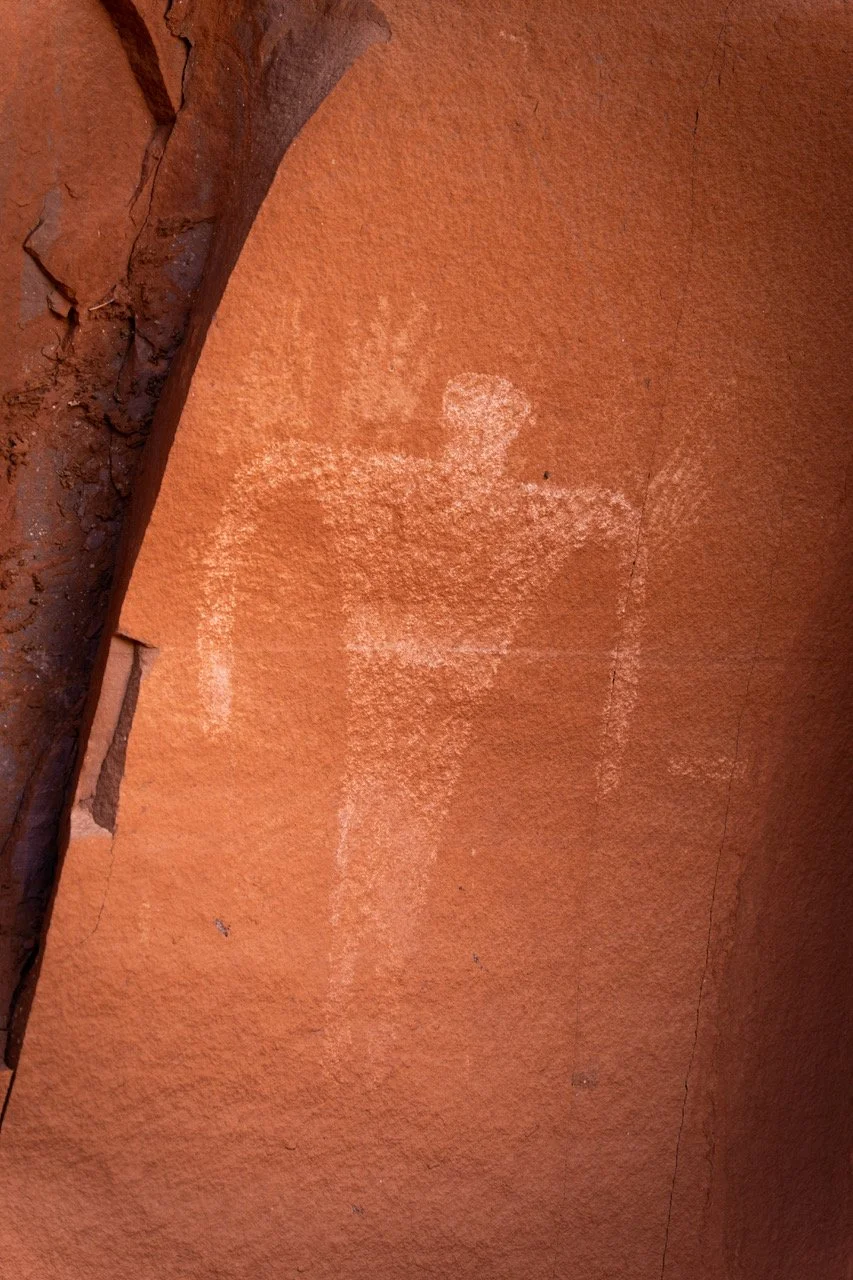The American Desert
Spot the crack. Christelle on Anaki, Indian Creek. Photo: Ryan Balharry
There’s no phone signal in the desert. Christelle and I couldn’t contact anyone - but that didn’t matter since we had no need or desire to. We just pinned a note to the campsite board for Uisdean and Isabel to see when they arrived, and went climbing. I just left my phone at the bottom of my bag and after a few days, I realised I’d lost it. I figured it’d turn up by the time we gave back the rental car at the end of our 3-week climbing trip in the US. When I finally found the phone again the battery was dead, so it just tumbled through my belongings like a slow-motion washing machine. It’s funny how something so ‘essential’ to modern life quickly becomes surplus. The guidebook, however, was always flicked through with bruised fingers and scraped hands.
There’s no time in the desert, either. We woke when we felt like it; we slept when we were tired. There was only ‘now’ and ‘later.’ I found time began to alter; it folded and rolled gently outwards, like the undulating and expanding desert landscape around me. The rhythm of life changed because there was nothing to force it one way or another - only climbing.
We greeted old and new friends face to face, which made encounters more meaningful. Hey! Where are you from? What do you like about the desert? We reverted to basic principles: we’re camping here, climbing there, and we’ll see you when we see you. Everyone seemed to be happy to connect by sharing cams at the crag and stories around the camp fire. We even met someone who proudly introduced themselves as a ‘Trash Panda,’ complete with costume and beers, pre-drinking before the Halloween party. This night was another entertaining American experience, and from what I can remember there was a lot of dancing, bare skin and wax boxes on fire. I never fully understood the obsession with the boxes.
I found ‘time’ to be inescapable, however. High above the desert floor, but far below the top of the cliff, my climbing stalled. Pumped stupid, fingers clawing at a crack, I knew my time was up. With feet starting to slip against the rusted sandstone, I started thinking about my last cam, stuffed hastily into the crack. I’ve climbed enough to know I was about to fall, air-time was imminent, and spent the next few seconds - which felt like hours - desperately trying to hang on. You’re gonna take a big one! A voice inside my head chuckled. Then suddenly I’m whooshing through the air, arms wheeling like mad, and the slow motion free-fall took over.
Crack climbing was like going back to school, and something I really enjoyed. Initially, it was a shit-show outside of the obvious easy (hand) sizes, and I’d let go out of pain rather than actually fall off. My mind would start to protest: my foot’s stuck, owww, move it, shitmyfootisstuck, owwwwwww! But eventually, with the help of Uisdean and his instructions, we wedged our limbs more effectively into the cracks. It still seemed to be a race against the pain, but we could at least watch and see how Uisdean did it, then try to copy. It was also useful to have friends around, so we could borrow more cams. The stories of needing eight cams of the same size were true! Thankfully, my unfamiliarity with the American grading system was kind on my ego. 5.10+ might as well have been ‘Bruises Backs of the Hands’ or ‘Fingers in a Light Socket.’ I stopped translating the grades into Euros or British Pounds once I learned it was supposed to be 6b!
We slowly became a part of the desert, thanks to the sandy soil. The dirt changes depending on the sky; in the morning it’s a cold, wet, bourbon sand. By the afternoon it’s a hot and rust-coloured dirt. At night, when the wind blows, a fine dust filtered through the mesh inner of our tent, coating us in a red layer like icing sugar on a cake. The dirt stretches for miles and miles and miles (it’s ‘big country,’ as they say) and I didn’t know what to do with all this open space. I looked at the petroglyphs and imagined being here 2000 years ago, and had to sit down. It reminded me of when I went on a school trip to the World War II battlegrounds in the north of France. Being about eleven years old, my classmates and I could just barely comprehend what this place was; what it represented. Instead, we found old bits of metal (and even what looked like a grenade) and threw them around.
After a few weeks, I couldn’t decide if I needed more of the desert, more time, or more climbing. I wanted it all, to explore and scrape and climb, and each day I became aware of how little I knew. I just started to understand how delicate and unique the ecosystem is; how time didn’t actually matter; and how to lock my fingers just so, jamming them until they felt good. But then we had to leave, as is always the way, and we said goodbye to our friends. Packing everything into the rental car (‘there’s my phone!’) and doing a cam-amnesty, we said farewell and drove out of the desert, with the setting sun painting everything golden.


